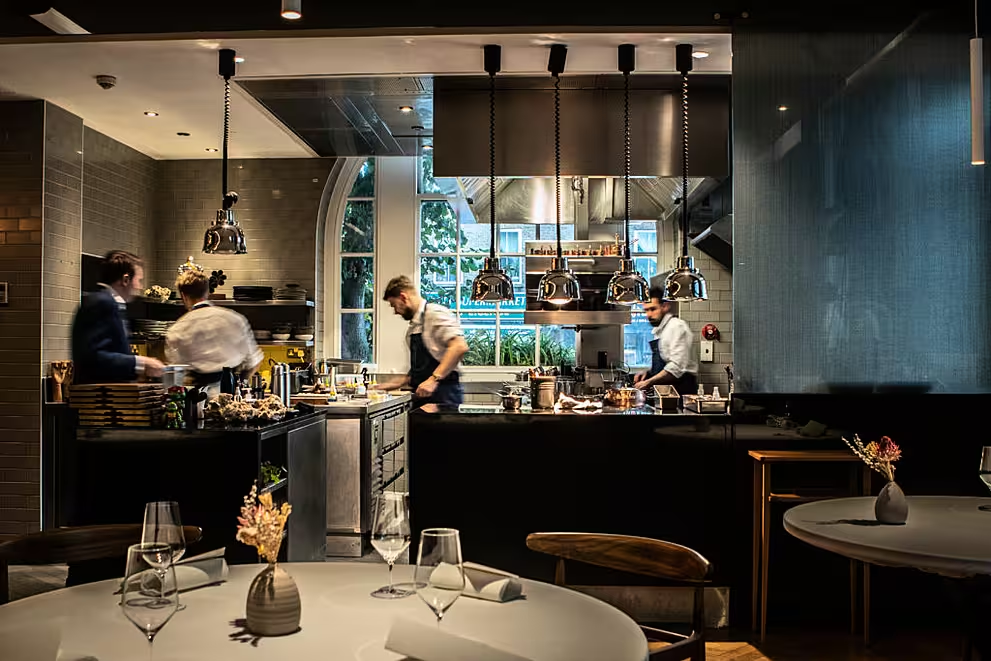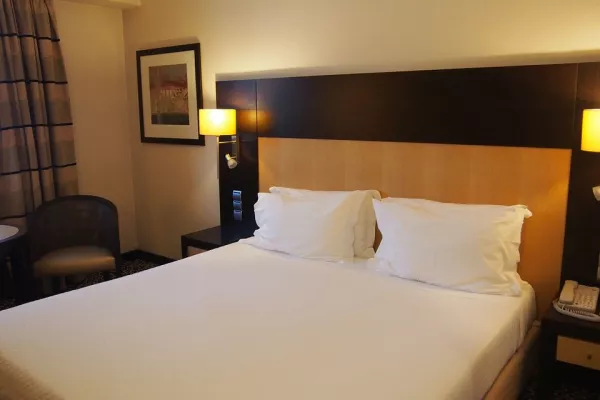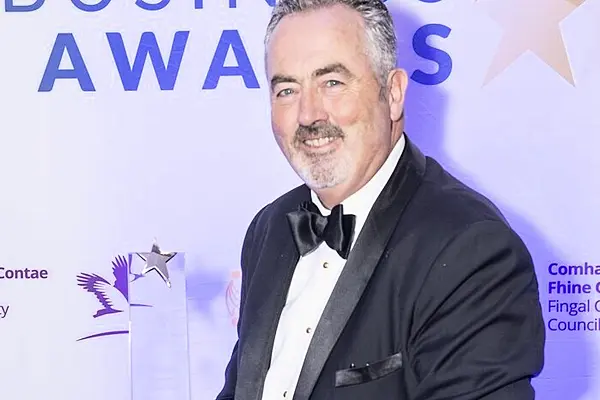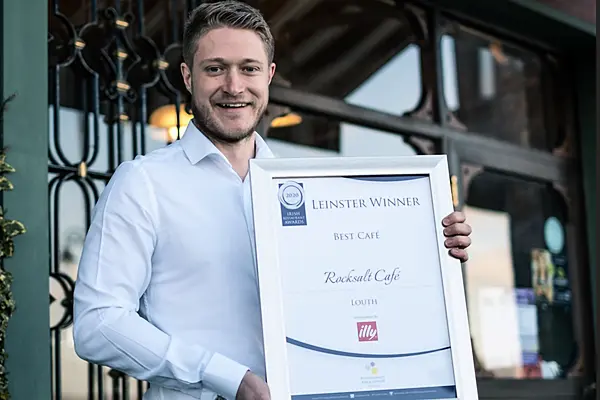‘I don’t think I’ve ever cried so much in my life!’ says chef Rafael Cagali, of receiving a second Michelin star at Brazilian restaurant Da Terra, in London. Cagali recently opened his second restaurant, Elis. He talks to Hospitality Ireland about how he came to cooking – via pot-washing – and the inspiration of his Brazilian-Italian heritage.
This article was originally published in the Winter 2022 issue of Hospitality Ireland Magazine, in December of 2022.
Tell us about your background – where you grew up, studied, etc.
I grew up in São Paulo and lived there until I was 20, before I then moved to London. I was studying economics and learning English in London, but I hated it.
What first drew you to food and cooking?
While I was studying, I was living around Fulham Broadway and I needed a job, so I started working as a pot-washer and a cook at a local brasserie. Eventually, I realised I enjoyed the kitchen much more than my studies, and with the encouragement of my head chef at the brasserie, I decided to go to culinary school at Westminster Kingsway [College].
My family does have a history in food and hospitality. My mother used to work in catering and owned a restaurant/jazz bar in São Paulo while I was a kid, so I unknowingly grew up around the industry.
When did you first realise that you wanted to do this professionally?
My time at culinary school cemented my passion for cooking and my desire to try and achieve as much as I could in the industry. After culinary school, I went off to work with some chefs who have had a huge influence on my career: Quique Dacosta, Martín Berasategui, Heston Blumenthal and Simon Rogan. Their passion and creativity was another driving factor for me to realise how great this industry is.
What was your first big role?
Taking on the head chef role at Simon Rogan’s Aulis, in London.
What was that like?
I had worked with Simon before, at Fera, so I knew the philosophy and, of course, the level of quality required, but it was my first head chef role and taught me a lot of important skills.
Tell us about opening Da Terra.
Opening Da Terra in 2019 was initially difficult. We were very quiet, and there was a lot of work that needed to be done to the space. Luckily, my team in the kitchen and my husband Charlie’s front-of-house team were able to rise to the challenge. Winning our first star within months definitely helped, and eventually we overcame all the issues that faced us.

Tell us about Da Terra – the ethos, food, service, etc.
Da Terra’s food is principally inspired by my Brazilian and Italian heritage, but also very much influenced by the cultural melting pot that is Brazil and the other places I’ve worked in my career – Spain, Japan, etc.
We serve a blind menu to our guests alongside suggested wine and nonalcoholic pairings. We like serving the menu blind, as we don’t want our guests to come in with any preconceptions of our style or what they’re going to eat. I think the service at Da Terra is very personal. Often, chefs will deliver the courses and explain the identity, history and influence behind the dish. We are a very small and intimate space, so it felt natural to keep the service intimate and relaxed.
What was it like to win a first, and then a second, Michelin star?
The first star was amazing, and it happened so quickly, which was great. It really boosted our booking numbers and gave us confidence that what we were doing was right. The second star, during Covid, was unbelievable. It felt very strange receiving the award while I was at home and the restaurant wasn’t open, but it was a great moment. I don’t think I’ve ever cried so much in my life!
Tell us about deciding to open a second restaurant.
I have wanted to explore some of the more relaxed elements of Brazilian and Italian food culture for a while now, drawing on everything from my favourite street food to family meal celebration dishes that my grandma used to make. When the opportunity for a new site under the same roof as Da Terra [in the Town Hall Hotel, Bethnal Green] became available, it felt like a perfect opportunity, and I felt more comfortable about going ahead with it.
In what ways will it be different or similar?
It will be a lot more casual than Da Terra, of course. We want it to be a place where you can get delicious food that is still inspired by my Brazilian-Italian heritage. It’s nice to do a larger menu, where you can share dishes and have a bit more flexibility on what you’d like to have on the menu. It should still be nice and intimate, as the dining room is small.

In what ways are you changing perceptions around Brazilian food?
I think there is very little representation for Brazilian food in general in the UK. The only Brazilian restaurants in London are typically Brazilian barbecue spots, and I don’t think it showcases the diversity we have in our culture in Brazil. I hope the food I am cooking sheds more of a light on the range of influences – Spanish, Portuguese, Japanese, AfroBrazilian – in Brazilian culture.
What makes a great restaurant?
Good food and wine is, of course, essential, but it should also be fun – it shouldn’t feel stiff. You should be having a fun time.
What are the changing trends in hospitality – people’s expectations, new elements, etc.?
I think people, more than ever, are looking for a new experience. With the price of dining out going up – and, ultimately, becoming more and more exclusive and a less-frequent happening for most people – I think providing an experience to your guest that they can’t get elsewhere is more important than ever. I think, at Da Terra and Elis, we do a good job of that and stand out amidst the vast number of great restaurants in London.
What are the major challenges at the moment?
The fallout from Brexit and the pandemic have taken its toll on the hospitality industry, as we all know. The major challenge right now is staffing. It is harder now than ever to find staff for both Da Terra and Elis. As always, we must adapt and be flexible to the changes in our industry. Costs are also a major challenge. With everything becoming more expensive, we have to adjust and reflect that change in our prices.
What are the main opportunities?
Periods like this always provide opportunities to learn how to be better at adapting to change. A big opportunity at the moment is focusing on training up and teaching the staff we have at Da Terra and Elis. With staffing being an issue for everyone, it is important we give people the right resources and opportunities, and it has been a great opportunity for our team to learn how to adapt more.
Do you think that the pandemic has changed what we look for in hospitality?
I think, more than ever, people are valuing being looked after when you go out to eat. With the pandemic restricting dining and also restricting how we interact with our guests, it is great to be able to return to making sure our guests have a great time and forge relationships with them.
Any other plans on the horizon for the next year or so?
Top secret!
DA TERRA AT A GLANCE:
How many covers (lunch and dinner)? 26 only, for a single service
Number of staff members (front and back of house)? 15 in total
Signature dish? Moqueca (Brazilian fish stew made with dendê oil)
ELIS AT A GLANCE:
How many covers (lunch and dinner)? 32
Number of staff members (front and back of house)? 4 kitchen, 4 front of house
Signature dish? Pecorino churros and monkfish with tucupi glaze








